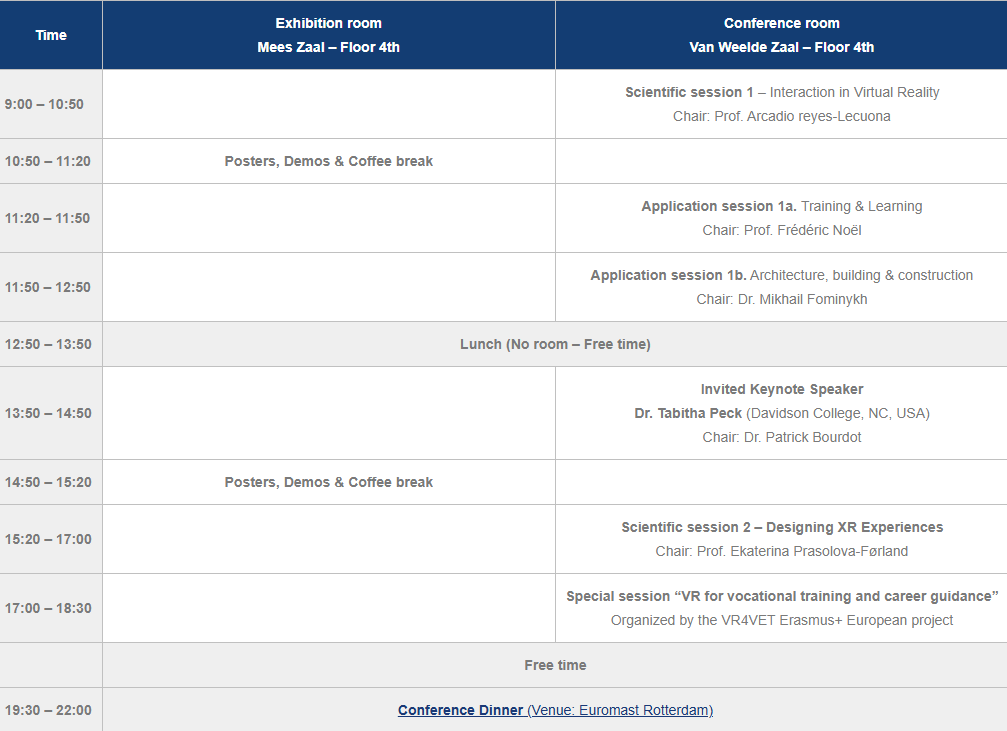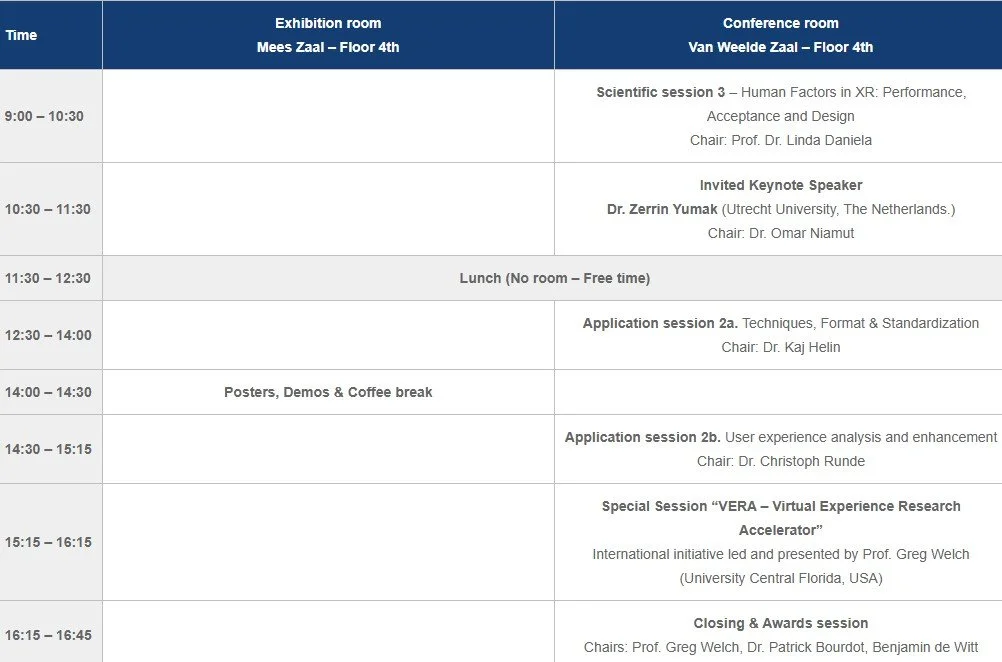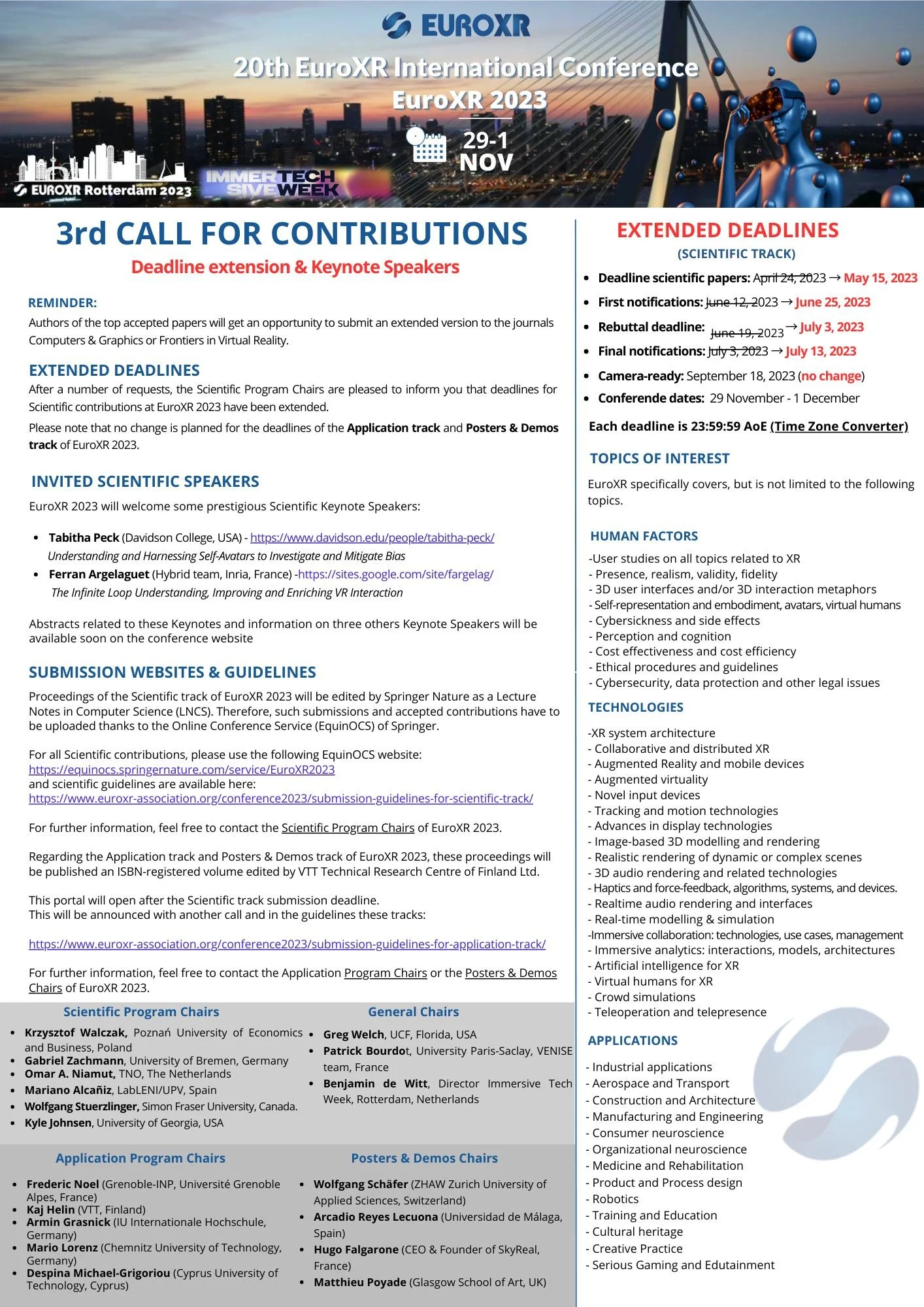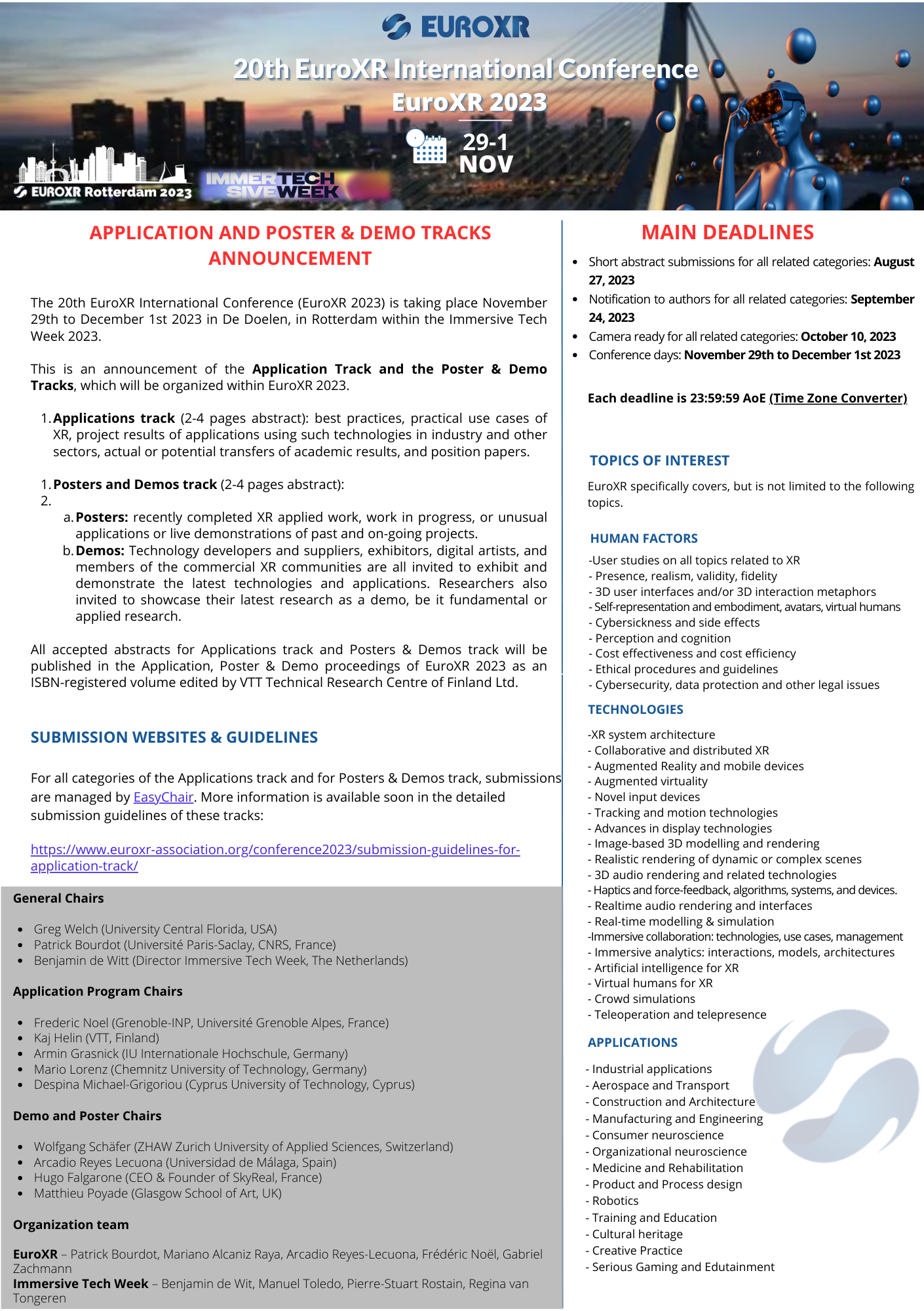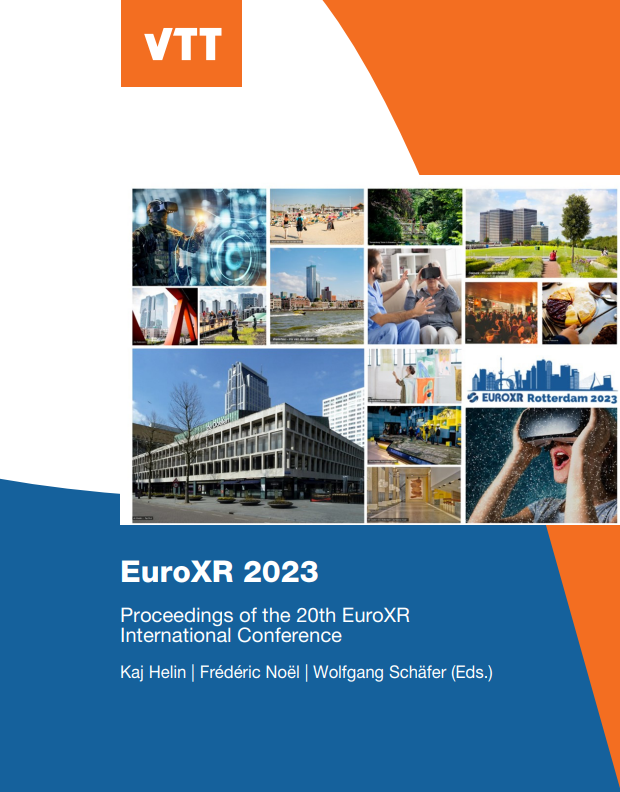EuroXR Association would like to cordially invite you to contribute to the 20th EuroXR International Conference – EuroXR 2023, to be held collocated with the Immersive Tech Week from November 29th to December 1st 2023, at De Doelen, in Rotterdam, The Netherlands.
ABOUT
This conference follows a series of successful international conferences initiated in 2004 by the INTUITION Network of Excellence in Virtual and Augmented Reality, supported by the European Commission until 2008. Embedded within the Joint Virtual Reality Conferences (JVRC) from 2009 to 2013, it was known as the EuroVR international conferences from 2014 and until 2020. This year, EuroXR will be held collocated with Immersive Tech Week (formerly VRDays)
Apart from annually gathering the EuroXR members for the association life, the focus of EuroXR conference is on novel VR/AR/MR technologies, including software systems, display technology, interaction devices, and applications. Besides papers on the latest scientific results and highlights from many application fields, the EuroXR conference series aims at creating a unique human-dimension framework, interconnecting European and international XR communities, for knowledge cross-fertilisations between researchers, technology providers, and end-users.
In-person conferences provide a unique opportunity for researchers to meet, chat, and catch up on the latest developments in the field, as well as absorb all the excellent talks and demos. It is also super important to build networks, especially for early career researchers.
Together we drive XR forward
TOPICS
Technologies
Technologies related to Virtual, Augmented, and Mixed Reality (VR/AR/MR), collaborative and distributed environments, mobile devices, 3D rendering issues, real-time modeling and simulation, multimodal interaction, use cases.
Human factor issues
User studies and evaluation, presence and cognition, 3D user interfaces and interaction metaphors, self-representation and embodiement, virtual humans, sickness and side effects, realism, validity and fidelity, cost effectiveness and efficiency.
Important Dates
For the Scientific track, contributions deadlines are:
Dealine for all Scientific submissions (Long, Medium, Short): April 24, 2023 → May 15, 2023 – 23:59:59 AoE
First notifications (rebuttal procedure): June 12, 2023 → June 25, 2023 – 23:59:59 AoE
Rebuttal deadline: June 19, 2023 → July 3, 2023 – 23:59:59 AoE
Final notifications for all Scientific submissions: July 3, 2023 → July 13, 2023 – 23:59:59 AoE
Camera ready for all accepted Scientific papers: September 18, 2023 – 23:59:59 AoE (no change)
Applications
Applications of VR/AR/MR in industry, architecture, manufacturing and engineering, medical and rehabilitation, consumer neuroscience, organizational neuroscience,process and product design, training and education, serious gaming and edutainment.
For the Application track, contributions deadlines are:
Short abstract submissions for all related categories: August 27, 2023 – 23:59:59 AoE
Notification to authors for all related categories:September 24, 2023. October 2, 2023 – 23:59:59 AoE
Camera ready for all related categories: October 10, 2023 – 23:59:59 AoE
COMMITTEES CHAIRS
General Chairs
Greg Welch (University Central Florida, USA)
Patrick Bourdot (Université Paris-Saclay, CNRS, France)
Benjamin de Witt (Director Immersive Tech Week, The Netherlands)
Application Program Chairs
Frederic Noel (Grenoble-INP, Université Grenoble Alpes, France)
Kaj Helin (VTT, Finland)
Armin Grasnick (IU Internationale Hochschule, Germany)
Mario Lorenz (Chemnitz University of Technology, Germany)
Despina Michael-Grigoriou (Cyprus University of Technology, Cyprus)
Scientific Program Chairs
Krzysztof Walczak (Poznan University of Economics and Business, Poland)
Gabriel Zachmann (University of Bremen, Germany)
Omar A. Niamut (TNO, The Netherlands)
Mariano Alcañiz (LabLENI, Universitat Politècnica de València, Spain)
Kyle Johnsen (University of Georgia, USA)
Wolfgang Stuerzlinger (Simon Fraser University, Canada)
Posters & Demos Chairs
Wolfgang Schäfer (ZHAW Zurich University of Applied Sciences, Switzerland)
Arcadio Reyes Lecuona (Universidad de Málaga, Spain)
Hugo Falgarone (CEO & Founder of SkyReal, France)
Matthieu Poyade (Glasgow School of Art, UK)
Organisation Team
EuroXR – Mariano Alcañiz-Raya, Patrick Bourdot, Frédéric Noël, Jerome Perret, Arcadio Reyes-Lecuona, Krzysztof Walczak, Gabriel Zachmann
Immersive Tech Week – Benjamin de Wit, Rayyan Farrukh, Pierre-Stuart Rostain, Manuel Toledo, Regina van Tongeren
INTERNATIONAL PROGRAM COMMITTE
Alcañiz, Mariano (Universidad Politécnica Valencia-LabLENI, Spain )
Amano, Toshiyuki (Wakayama University, Japan )
Arlati, Sara (Consiglio Nazionale delle Ricerche, Italy )
Bimberg, Pauline (Universität Trier, Germany )
Blat, Josep (Universitat Pompeu Fabra Barcelona, Spain )
Bönsch, Andrea (RWTH Aachen University, Germany )
Boulanger, Pierre (University of Alberta, Canada )
Capobianco, Antonio (Université de Strasbourg, France )
Castet, Julien (Immersion, France )
Chen, Weiya (Huazhong University of Sciences and Technology, China )
Cumo, Fabrizio ( , Italy )
De Antonio, Angelica (Universidad Politecnica de Madrid, Spain )
Duval, Thierry (IMT Atlantique, France )
Farella, Mariella (National Research Council of Italy, Italy )
Flotyński, Jakub (Poznań Univ.\ of Economics and Business, Poland )
Fuhrmann, Arnulph (TH Köln, Germany )
Galvez, Akemi (Universidad de Cantabria, Spain )
Gattullo, Michele (Polytechnic University of Bari, Italy )
Gonzalez, Pascual (Universidad Castilla La Mancha, Spain )
Gorbunov, Andrey (Aviareal, Russia )
Górski, Filip (Poznań University of Technology, Poland )
Häfner, Polina (KIT Karlsruhe, Germany )
Helin, Kaj (VTT, Finland )
Hoek, Krista (LUMC, Netherlands )
Hughes, Chris (Salford University, UK )
Iglesias, Andres (Universidad de Cantabria, Spain )
Interrante, Victoria (University of Minnesota, USA )
Iwai, Daisuke (University of Osaka, Japan )
Jung, Yvonne (Hochschule Darmstadt, Germany )
Kadlubsky, Alina (Open AR Cloud Association, USA )
Karaseitanidis, Ioannis (ICCS, Greece )
Katika, Tina (Institute of Communication and Computer Systems , Greece )
Kato, Hirokazu (Nara Institute of Science and Technology, Japan )
Kloos, Uwe (Reutlingen University of Applied Sciences, Germany )
Kuhlen, Torsten (RWTH Aachen University, Germany )
Kuts, Vladimir (Tallinn University of Technology, Estonia )
Ladeveze, Nicolas (LISN – CNRS, FRANCE )
Lamberti, Fabrizio (Politecnico di Milano, Italy )
Lavoue, Guillaume (ENISE, Ecole Centrale de Lyon, France )
Leoncini, Paolo (Centro Italiano Ricerche Aerospaziali, Italy )
Llorens, Roberto (Universidad Politécnica Valencia-LabLENI, Spain )
Lorenz, Mario (TU Chemnitz, Germany )
Makino, Mitsunori (Chuo University, Japan )
Mayer, Anjela (Karlsruhe Institute of Technology, Deutschland )
Mestre, Daniel (Aix-Marseille University / CNRS, France )
Molina Massó, José Pascual (Universidad Castilla La Mancha, Spain )
Niamut, Omar (TNO, Netherlands )
Nickel, Peter (Deutsche Gesetzliche Unfallversicherung, Germany )
Noël, Frédéric (Grenoble Institute of Technology, France )
Perret, Jerome (Haption, Germany )
Poyade, Matthieu (Glasgow School of Art, UK )
Reiners, Dirk (University of Central Florida, USA )
Reyes-Lecuona, Arcadio (Universidad de Málaga, España )
Ritchie, James (Heriot-Watt University, UK )
Schäfer, Wolfgang (ZHAW School of Management and Law, Switzerland )
Si-Mohammed, Hakim (University of Lille, France )
Soccini, Agata Marta (University of Torino, Italy )
Sommaruga, Lorenzo (University of Applied Sciences and Arts of Southern Switzerland (SUPSI), Switzerland )
Staadt, Oliver (Universität Rostock, Germany )
Tan, Toni (University of Bremen, Germany )
Vasser, Madis (University of Tartu, Estonia )
Xu, Yi (Oppo, China )
Zachmann, Gabriel (University of Bremen, Germany)
TOPICS
TOPICS OF INTEREST include, but are not limited to:
Technologies
AR Waveguide technologies
XR system architecture
Collaborative and distributed XR
Augmented Reality and mobile devices
Augmented Virtuality
Novel inpunt devices
Tracking and motion technologies
Advances in display technologies Image-based 3D modeling and rendering
Realistic rendering of dynamic or complex scenes
3D audio rendering and related technologies
Tracking and motion technologies
Advances in display technologiesImage-based 3D modelling and rendering
Realistic rendering of dynamic or complex scenes
3D audio rendering and related technologies
Haptics and force-feedback, algorithms, systems, and devices.
Realtime audio rendering and interfaces
Real-time modelling & simulation
Immersive collaboration: technologies, use cases, management
Immersive analytics: interactions, models, architectures
Artificial intelligence for XR
Virtual humans for XR
Crowd simulations
Teleoperation and telepresence
Human factor issues
Accessibility in XR
Environmental Impact of XR
UI for XR headsets (voice, controllers, rings, etc.)User studies on all topics related to XR
Presence, realism, validity, fidelity
3D user interfaces and/or 3D interaction metaphors
Self-representation and embodiment, avatars, virtual humans
Cybersickness and side effects
Perception and cognition
Cost effectiveness and cost efficiency
Ethical procedures and guidelines
Cybersecurity, data protection and other legal issues
Applications
Human-Robot Interaction in XR
Industrial applications
Aerospace and Transport
Construction and Architecture
Manufacturing and Engineering
Consumer neuroscience
Organizational neuroscience
Medicine and Rehabilitation
Product and Process design
Robotics
Training and Education
Cultural heritage
Creative Practice
Serious Gaming and Edutainment
PRELIMINARY PROGRAM OVERVIEW
DAY 1. Wednesday, November 29
DAY 2. Thursday, November 30
DAY 3. DAY 3. Friday, December 1
PRESENTATION GUIDELINES
Conference Slide Templates (.pptx)
Keynote speakers
1 hour for each keynote speaker (50 minutes for talk + 10 minutes for questions).
Scientific track (based on accepted papers, published in the LNCS Springer volume)
Long scientific papers: 30 minutes including questions (23 minutes for talk + 7 minutes for questions)
Medium scientific papers: 20 minutes including questions (15 minutes for talk + 5 minutes for questions).
Short scientific papers: 10 minutes including questions (8 minutes for talk + 2 minutes for questions)
Application track (based on accepted abstracts, published in the VTT volume)
Application talks: 15 minutes including questions (10 minutes for talk + 5 minutes for questions).
Poster and Demonstration presentations
The presentations of the Scientific posters, Application posters, and Demonstrations, will be based on two complementary and mandatory sessions:
One Fast-forward session: 2 minutes for each, to present 2 slides, no more. these slides should be submitted in advance. Authors will be contacted to upload these slides.
Four Presentation sessions during coffee breaks: presenters will have to be present in the poster and demos room during these four slots.
Poster format
Posters should be A0 size, portrait orientation. Poster authors have to handle the physical printing of their posters and have to bring them to the conference location.
KEYNOTE SPEAKERS
Dr. Tabitha C. Peck
Dr. Ferran Argelaguet
Keynote: Understanding and Harnessing Self-Avatars to Investigate and Mitigate Bias
Tabitha C. Peck is currently an Associate Professor of mathematics and computer science at Davidson College, Davidson, NC, USA. Her research interests include developing and testing usable virtual reality systems, and the investigation of the psychological implications of embodiment in self-avatars with the goal of using avatars to reduce and mitigate bias. She has been both the Journal and Conference Paper Program Chair for IEEE VR, and the Journal Paper Science and Technology Chair for IEEE ISMAR. She is a Review Editor for Frontiers in Virtual Reality and an Associate Editor for Presence. She received the Ph.D. degree in computer science from The University of North Carolina at Chapel Hill, Chapel Hill, NC, USA, in 2010. She was the recipient of numerous honorable mentions and nominations for best paper awards at IEEE VR, and received the NSF CAREER Award in 2020. She is an IEEE Senior Member.
Keynote: The Infinite Loop Understanding, Improving and Enriching VR Interaction
Ferran Argelaguet received the Habilitation degree in computer science from the University of Rennes 1, Rennes, France, in 2021, and the Ph.D. degree in computer science from the Universitat Politécnica de Catalunya, Barcelona, Spain, in 2011. Since 2016, he has been a Research Scientist with the French Research Institute in Computer Science and Applied Mathematics (Inria), Rennes, France. His research interests include virtual and augmented reality, human perception and cognition, and human-computer interaction.
Pr. Benjamin C. Lok
Keynote: Socially Interactive 3D Digital Humans: When AI meets XR for Non-verbal Communication
Dr. Zerrin Yumak is an assistant professor in the Information and Computing Sciences Department at Utrecht University in the Netherlands. She is the director of the Motion Capture and Virtual Reality Lab (https://www.uu.nl/mocapvrlab). She has 15 years of experience in the area of believable virtual humans and social robots, in particular non-verbal behavior synthesis, multi-party interaction and emotion and memory modeling. She obtained her PhD from University of Geneva, Switzerland. She did her post-doc at Swiss Federal Institute of Technology Lausanne and Nanyang Technological University in Singapore. She has been the Associate Editor of Visual Computer and Computer Animation and Virtual Worlds journals and she is the program committee member of several conferences such as ACM Siggraph/ Eurographics Symposium on Computer Animation (SCA), ACM Siggraph Motion In Games (MIG), Siggraph Asia, IEEE AIVR, IEEE VR, ACM Intelligent Virtual Agents (IVA) and International Conference on Autonomous Agents and Multiagent Systems (AAMAS). She was the program chair of Computer Animation and Social Agents (CASA 2019) conference. She co-organized the MARCH@IEEEAIVR (Modeling and Animating Realistic Crowds and Humans), GENEA@ICMI (Generation and Evaluation of Non-verbal Behaviour for Embodied Agents) and MASSXR@IEEEVR (Multi-modal affective and Social Behavior Analysis and Synthesis in Extended Reality (MASSXR) workshops. Her papers received multiple awards. She is the co-organizer of the Embodied AI initiative at Utrecht University, coordinator and scientific director of the Embodied AI Lab for Social Good. Website: https://www.uu.nl/staff/ZYumak
SPECIAL SESSION OVERVIEW
Day 2 – Thursday, November 30 (17:00-18:30)
Van Weelde Zaal – Floor 4th
VR for vocational training and career guidance
Dr. Mikhail Fominykh, IMTEL NTNU, Norway.
Prof. Ekaterina Prasolova-Førland, IMTEL NTNU, Norway.
Leonie van Haren, Techniek College Rotterdam, The Netherlands.
This special session is organized by the VR4VET project, and an EU-funded initiative aiming at designing open-source VR applications, and training how to integrate them into counseling and educational processes.
Program: https://www.vr4vet.eu/vr-for-vocational-training-and-career-guidance/
Day 3 – Friday, December 1 (15:15-16:15)
Virtual Experience Research Accelerator
Prof. Greg Welch, University Central Florida, USA.
This special session presents the VERA international initiative, a Mechanical Turk-like ecosystem (hardware, software, and people) that will enable VR researchers to carry out studies using large and diverse populations, thus enabling high-quality human subject research studies that will generalize to the population at large.
Abstract: Click here to download
VERA webpage: https://sreal.ucf.edu/vera/
CALL FOR CONTRIBUTIONS SCIENTIFIC TRACK
Submission procedure and website
Instructions for uploading the final camera-ready
1) Authors of the top papers will get an opportunity to submit an extended version to the journals Computers & Graphics or Frontiers in Virtual Reality
2) Springer (EquiOCS) website for the Scientific paper submissions is open: https://equinocs.springernature.com/service/EuroXR2023
Scientific papers must describe novel research results and will be published in a Springer LNCS volume (Lecture Notes in Computer Science).;
Authors can choose between three kinds of Scientific paper submissions:
Full paper: 14-20 pages in the Springer format (about eight pages in traditional two-column format) with ~30 minutes presentation at the conference
Medium paper: 8-12 pages in Springer’s format with ~20 minutes of presentation
Short paper: 4-6 pages Springer format with ~10 minutes presentation. This type is meant for work-in-progress, position papers, and similar content.
All scientific submissions will have to follow the one column Springer format (see below, Paper Formatting section). Please note that indicated paper lengths do not include references.
The topics of interest of scientific contributions papers may be seen here.
All submissions will undergo a rigorous double blind peer reviewing process among the International Program Committee (IPC) Based on their reviews, the Scientific Program Chairs of EuroXR 2023 will select the best submissions to be presented at the conference. All papers accepted in the scientific track will be published in the scientific proceedings of EuroXR 2023, edited by Springer as a volume of the Lecture Notes in Computer Science (LNCS) series. Indexing information of the LNCS series is available on this Springer webpage.
Submissions have to be uploaded to the management system of Springer (EquinOCS) here:. https://equinocs.springernature.com/service/EuroXR2023
Submitted manuscripts must not have been previously published. A manuscript is considered to have been previously published if it has appeared in a peer-reviewed journal, magazine, book or conference proceedings that is reliably and permanently available afterwards in print or electronic form to non-attendees, regardless of the language of that publication. A manuscript identical or substantially similar in content (in its entirety or in part) to one submitted to EuroXR 2023 should not be simultaneously under consideration for another conference or journal during any part of the review process, from the submission deadline until final notifications of decisions are emailed to the authors.
Submissions (including citations and optional videos) should not contain information that identifies the authors, their institutions, funding sources, or their places of work. Relevant previous work by the authors should be cited in the third person to preserve anonymity.
In case of acceptance, at least one author is expected to present the paper in person at the conference.
Paper Formatting
Authors should consult Springer’s Instructions for Authors of Proceedings and use either the LaTeX or the Word templates provided on the authors’ page for the preparation of their papers. For your convenience, Springer’s proceedings LaTeX templates are also available in Overleaf.
To allow for a double blind peer reviewing process, please make your submissions fully anonymous (no author names, nor affiliation, only anonymous self references). Papers which are not anonymous will be automatically desk-rejected.
Review process
The review process will be performed in two stages:
During the first stage, all submissions will be reviewed by at least three independent reviewers, and notifications will be sent to the authors. Authors will then have an opportunity to clarify issues identified by the reviewers. In the second stage, the reviewers will make a final recommendation on the paper.
Notification categories
At the end of the reviewing procedure of the Scientific track, submitted contributions will have three possible status.
Some submissions will be accepted in their original category. Some others, originally submitted as scientific full papers, might get accepted only as scientific medium/short papers. Such contributions will be published in the LNCS Springer volume of the scientific proceedings of EuroXR 2023 too, but authors will have to re-size their paper.
The remaining submissions will not be accepted for the Scientific track of EuroXR 2023. However, some of them might get redirected to one of the other contribution categories of the conference, i.e, the Application track or the Posters & Demos track.
Camera Ready Instructions
Authors accepted contributions will have to prepare a camera-ready file set. This set is composed of:
Camera-ready file (PDF),
Full source files (i.e. Latex file(s) and all the image files, or the full Word file),
Online signature of the Springer Consent-to-Publish form.
Springer encourages authors to include their ORCIDs with their names and affiliations. We also kindly ask all authors to adhere to Springer’s Code of Conduct (https://www.springernature.com/gp/authors/book-authors-code-of-conduct)
The corresponding author of each paper must complete and sign a Springer Consent-to-Publish form, acting on behalf of all of the co-authors of the paper. The author signing this form should match the corresponding author marked on the paper. After the camera-ready deadline, no changes to the papers can be made.
Thanks to the EquinOCS system, the authors of accepted papers can sign the Springer Consent-to-Publish form online. See detailed instructions here: https://support.springernature.com/en/support/solutions/articles/6000245512-conference-proceeding-authors#6.-Submit-the-Final-version—for-accepted-papers.
Important dates
Dealine for all Scientific submissions (Long, Medium, Short): April 24, 2023 → May 15, 2023 – 23:59:59 AoE
First notifications (rebuttal procedure): June 12, 2023 → June 25, 2023 – 23:59:59 AoE
Rebuttal deadline: June 19, 2023 → July 3, 2023 – 23:59:59 AoE
Final notifications for all Scientific submissions: July 3, 2023 → July 13, 2023 – 23:59:59 AoE
Camera ready for all accepted Scientific papers: September 18, 2023 – 23:59:59 AoE (no change)
For further information, please don’t hesitate to contact the Scientific Program Chairs of EuroXR 2023
CALL FOR CONTRIBUTIONS APPLICATION,
POSTER & DEMOS TRACKS
SUBMISSION GUIDELINES
SCIENTIFIC TRACK
SUBMISSION GUIDELINES FOR APPLICATION,
POSTER & DEMO TRACKS
These guidelines apply to the following contributions:
Application talks (2-4 pages abstract): best practices, practical use cases of VR or AV/AR/MR, project results of applications using such technologies in industry and other sectors, actual or potential transfers of academic results, and position papers.
Posters (2-4 pages abstract): recently completed VR or AV/AR/MR applied work, application in progress, or unusual applications.
Demos or Exhibitions (2-4 pages abstract): may accompany any type of submission or be submitted independently. They consist of live demonstrations of past and on-going projects. Technology developers and suppliers, exhibitors, digital artists, and members of the commercial VR or AV/AR/MR communities are all invited to exhibit and demonstrate the latest technologies and applications. Must include a short description.
The topics of interest for these contributions may be seen here.
The Application Program Chairs and Posters & Demos Chairs, depending on the submission category, will manage acceptance of the contributions. All accepted abstracts in these tracks will be published in the Application, Poster and Demo proceedings of EuroXR 2023 as an ISBN-registered volume edited by VTT Technical Research Centre of Finland Ltd.
In submitting an abstract the author(s) agree that, upon acceptance, they will prepare the final version in time for inclusion in the proceedings and will present their contribution at the conference.
Abstract Formatting
The abstracts are to be submitted in the English language as a PDF file using the Microsoft Word template available here. The number of pages is indicative.
Abstract Submission
Only abstracts submitted before the deadline (see below) via our EasyChair portal will be considered for reviewing and publication in the proceedings.
Camera Ready Instructions
Authors whose contribution is accepted are required to upload the final version of their abstract on the EasyChair portal as source (Microsoft Word DOCX), before (date to be desclosed)
Important dates for the Application and Posters & Demos tracks
Abstract submissions: August 27, 2023 – 23:59:59 AoE
Notifications to the authors: September 24 October 2, 2023 – 23:59:59 AoE
Camera ready of accepted abstracts: October 10, 2023 – 23:59:59 AoE
For further information, feel free to contact the Application Program Chairs or Posters & Demos Chairs of EuroXR 2023, depending on the category of contribution
SPONSORS & PARTNERS
SCIENTIFIC PROCEEDINGSS
EuroXR 2023: Proceedings of the 20th EuroXR International Conference
APPLICATION, POSTER & DEMO PROCEEDINGS
EuroXR 2023: Proceedings of the 20th EuroXR International Conference
REGISTRATION
Registration to the EuroXR 2023 conference
The 20th EuroXR International Conference – EuroXR 2023 is co-organized with VRDays Foundation to be collocated with Immersive Tech Week (ITW) from November 29th to December 1st, 2023 at de Doelen, Rotterdam (The Netherlands)
Therefore, the registration fees to attend at EuroXR 2023 provides a Full week access to ITW with a very attractive special discounted price.
Package for EuroXR 2023 attendees (access rights)
Full week access to ITW (except some specific social events)
Full access to EuroXR 2023 international conference sessions
Access (via our website + code) to Scientific Proceedings of EuroXR 2023 (published by Springer)
Free access (via our website) to the Application, Poster & Demo Proceedings (published by VTT)
Full access to the EuroXR 2023 Catering (specific logo)
Possibility to join the EuroXR 2023 Gala Dinner (Optional – additional registration fee)
Possibility to access to EuroXR association meetings (depending of EuroXR member duties)
Special Discounted Price for EuroXR 2023 attendees. Full week access to ITW (except some specific social events)
EuroXR Conference Attendance: €310.46
Regular Price for a full week access at ITW (After Early Bird deadline – Sept. 15). Please, note that EuroXR 2023 conference attendees will always have priority access to the EuroXR 2023 conference program.
ITW Full Week Access: €522.15
Please complete asap your registrations and payments to attend at EuroXR 2023 via this dedicated ITW webpage:
VENUE INFORMATION
Location
The EuroXR 2023 Conference will be held in presence at De Doelen, Rotterdam, The Netherlands as part of the Immersive Tech Week event.
De Doelen is only a 3 minute walk from Rotterdam Central Station which is connected to many local and international destinations
Address:
Schouwburgplein 50, 3012 CL Rotterdam, The Netherlands
Walk from the train station
De Doelen is located in the very heart of Rotterdam, a short walk (400 meters) from Rotterdam Central Station, tram, metro and bus stops. There several garages around the Doelen.
Entrances of the concert halls
Grote Zaal: Schouwburgplein 50
Jurriaanse Zaal: Kruisplein 30
Willem Burger Zaal: Kruisplein 40
Eduard Flipse Zaal: Karel Doormanstraat 223
Arrival by car
The venue is well situated and reachable by car. Since it is in the centre and we’d like you to keep the environment in mind please consider coming by public transport. Take extra travel time by car into account, especially on Friday and Saturday evenings due to crowds in the city center.
Parking facilities
There are several parking facilities around de Doelen. If you do wish to come by car, you can purchase parking permits via www.parkereninrotterdam.nl beforehand.
Arrival by bike
Dankzij onze centrale ligging zijn er veel mogelijkheden om uw fiets te parkeren om het gebouw heen. There are many spots where you can park your bike around the building, as well as an underground bicycle parking facility at Rotterdam Central Station.
GALA DINNER
🌟 Join Us for a Memorable Evening at EuroXR Gala Dinner! 🌟
📅 Date: November 30, 2023
🕢 Time: 19:30 onwards
📍 Venue: Euromast Rotterdam (https://euromast.nl/en/restaurant)
The EuroXR Conference invites you to the Gala Dinner, a night for networking and exquisite cuisine that promises to be the highlight of the event!
What to Expect:
Fine Dining: Savor a delectable gourmet dinner amidst the stunning backdrop of Rotterdam’s iconic Euromast.
Networking: Connect with fellow EuroXR enthusiasts, researchers, and professionals from around the world.
Breathtaking Views: Take in the breathtaking panoramic views of Rotterdam from the Euromast’s observation deck.
Regular ticket: €102.42Ticket for PhD Students: €52.74
Ticket purchase: Eventbrite site
🌟 We look forward to seeing you at the EuroXR Gala Dinner on November 30th at the Euromast Rotterdam! 🌟
EuroXR Awards 2023
As is tradition before officially closing the Conference we celebrated the best contributions across the Scientific Track, Application Track, and Poster & Demo Track during the Awards Ceremony.






